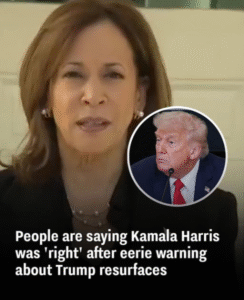She Warned Us: Kamala Harris’s Prediction About Trump Sends Shockwaves Through Social Media
It began as a clip—just three minutes long.
In the video, Kamala Harris, then Vice President and Democratic nominee for president, stood at a podium in October 2024 and delivered a chilling warning. Her voice was steady, her words deliberate. She spoke of Donald Trump’s desire for “unchecked power,” his admiration for authoritarian figures, and his willingness to use the U.S. military against American citizens. At the time, her remarks were dismissed by many as hyperbole, political theater, or partisan fearmongering.
Now, nearly a year later, those words have resurfaced—and they’ve proven disturbingly prescient.
Social media erupted this week as Harris’s speech circulated again, this time in the context of Trump’s deployment of the National Guard to Democratic-led cities without gubernatorial consent. In Los Angeles, protests erupted following controversial ICE raids. Trump responded by mobilizing 700 Marines and an additional 2,000 National Guard troops—actions that bypassed California Governor Gavin Newsom and sparked a legal battle over federal overreach.
The parallels to Harris’s warning were impossible to ignore.
“He wants a military that is loyal to him,” Harris said in the original clip. “One that will obey his orders even when he tells them to break the law or abandon their oath to the Constitution of the United States”. She referenced former Trump Chief of Staff John Kelly, a retired four-star general, who allegedly told her that Trump wanted generals like Adolf Hitler had—loyal not to the country, but to the man.
At the time, her comments drew criticism. Pundits accused her of exaggeration. Fact-checkers questioned her sources. Trump supporters called it fearmongering. But now, with military forces deployed against protestors and legal scholars sounding alarms, many are revisiting Harris’s words with a new lens.
“She warned us in just three minutes,” one viral post read. “Federalizing the National Guard in California isn’t ‘normal.’ It’s the first move.”
Political commentators have rushed to acknowledge the accuracy of Harris’s prediction. Mehdi Hasan wrote, “She was right. And the pundits who accused her of hyperbole should hang their heads in shame and offer profuse apologies to those of us who warned about what was coming”. Others echoed the sentiment: “I am not a Kamala Harris fan, but she nailed this one pretty well.”
The clip has become a rallying cry—not just for Harris supporters, but for anyone concerned about the erosion of democratic norms. It’s a reminder that warnings, even when unpopular, deserve attention. It’s also a reflection of how quickly political realities can shift.
In her original speech, Harris painted a stark picture of a second Trump term. “Those who once tried to stop him from pursuing his worst impulses would no longer be there,” she said. “So the bottom line is this: we know what Donald Trump wants. He wants unchecked power”.
That phrase—“unchecked power”—has become the centerpiece of the conversation. It’s being quoted in headlines, reposted in tweets, and dissected in op-eds. For many, it encapsulates the fear that Trump’s presidency has moved beyond traditional politics and into something more dangerous.
The timing of the clip’s resurgence is significant. As Trump continues his second term, tensions between federal and state governments have escalated. Governors are pushing back. Courts are being tested. And citizens are taking to the streets—not just in protest, but in defense of constitutional principles.
Harris’s warning wasn’t just about Trump. It was about the fragility of democracy. It was about the need for vigilance, for accountability, for courage. And now, as her words echo across the digital landscape, they serve as both a vindication and a call to action.
For Harris herself, the moment is bittersweet. She lost the 2024 election to Trump, despite a strong campaign and widespread support. But her legacy as a truth-teller is being cemented. She spoke when it mattered. She named the danger. And now, the nation is reckoning with the consequences.
In a recent interview, Harris reflected on the clip’s resurgence. “I didn’t say those things lightly,” she said. “I said them because I believed the American people deserved honesty. And I still believe that.”
Her words are resonating—not just with her base, but with those who once doubted her. The shift is palpable. The conversation has changed.
And yet, the stakes remain high.
The deployment of military forces against civilians is not just a policy decision—it’s a moral one. It tests the boundaries of executive power. It challenges the role of the Constitution. And it forces every American to ask: What kind of country do we want to be?
Kamala Harris asked that question a year ago. She asked it with urgency, with clarity, and with conviction. And now, as her warning proves true, the nation must answer.
Social media is often dismissed as fleeting, superficial, reactive. But in this case, it has become a platform for reckoning. It has amplified a voice that was once ignored. It has turned a clip into a movement.
“She warned us,” people are saying. “And we didn’t listen.”
But it’s not too late.
The power of a warning lies not just in its accuracy, but in its ability to inspire change. Harris’s words have done that. They’ve sparked conversations, mobilized voters, and reminded the country that leadership is not about popularity—it’s about principle.
As the trial over Trump’s military deployment unfolds, and as governors push back against federal overreach, Harris’s clip will continue to circulate. It will be studied, quoted, remembered.
And perhaps, it will serve as a turning point.
Because sometimes, the truth comes quietly. Sometimes, it’s dismissed. But when it returns—when it proves itself—it demands to be heard.
Kamala Harris warned us.
Now, we’re listening.



